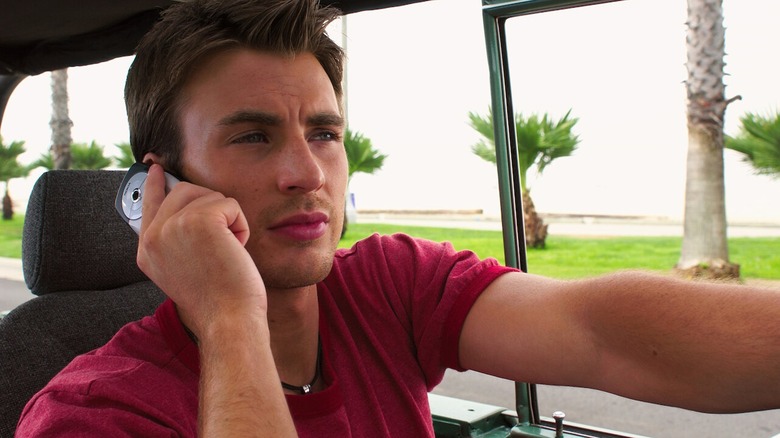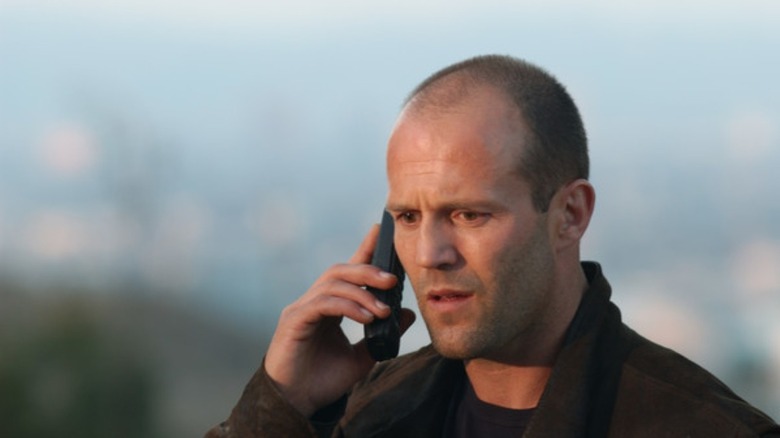The Suspenseful Crime Thriller That Brought Chris Evans And Jason Statham Together
Not every movie can be — or has to be — an unforgettable masterpiece. A much-needed space needs to be carved out for fun, sincere B-movies that you suddenly remember on a Saturday night and decide to revisit. The best kind of mediocre, yet delightful films are the ones that strike a perfect balance between compelling suspension of disbelief and mindless disbelief. One such title that hits this sweet spot is the 2004 crime thriller "Cellular," starring a pre-Captain America Chris Evans and a pre-"Fast & Furious" Jason Statham. If you haven't watched it, or don't remember too many details, I've got you covered.
Before we dive into the "Cellular" experience, we need to talk about Joel Schumacher's 2002 thriller, "Phone Booth." In the film, an unnamed, scheming sniper (Kiefer Sutherland) calls a phone booth, which is answered by a young publicist named Stuart (Colin Farrell). This is no accidental phone call, as the sniper is intimately aware of Stuart's life, which he uses as leverage for blackmail. The tense drama morphs into a morality play of sorts, as Stuart is a rather terrible person stuck in a dangerous situation, which raises questions about karmic justice and degrees of culpability. Writer Larry Cohen had conceived the barebones of "Phone Booth" 20 years before its theatrical release, which explains some of the rigid moral dilemmas presented in this early 2000s suspense tale.
Cohen also came up with the basic premise for "Cellular," and wrote an initial script that tackled the themes of narcissistic self-obsession due to society's over-reliance on — you guessed it — cell phones. This version of the script was solemn and cynical, where the protagonist wrestled with guilt while trying to shield loved ones from the consequences of his actions. Eventually, screenwriter Chris Morgan (who has written multiple screenplays for the "Fast & Furious" franchise) reframed it as a tale celebrating the heroism of the Everyman, where traditional action and thriller elements were mixed with situational humor. This formula, although clichéd, worked, as "Cellular" is fondly remembered as a decent suspense thriller with grounded performances.
Cellular evokes suspense and thrills via its cellphone motif
"Cellular" opens with science teacher Jessica Martin (Kim Basinger) being kidnapped and held prisoner by a group of men. The criminals demand something from her husband Craig (Richard Burgi), but Jessica has no idea what it is. After the gang's leader, Greer (Statham), smashes a wall phone to prevent her from escaping, Jessica uses good ol' science to piece together some wires and make a random call. This desperate call for help reaches Ryan (Evans), a young man who thinks she is playing a prank on him and doesn't take her words seriously at all. After some frustrating back and forth, Ryan decides to have her talk with local cop Mooney (William H. Macy), but things only get more dangerous when Jessica's kid is also found missing.
Yes, the premise sounds a bit unbelievable, and might I say, irritating, if you consider how much time Ryan and the police waste debating whether Jessica's distress call is genuine or not. But director David R. Ellis presents these gimmick-laden scenarios with sincerity, where the most farfetched situations sound plausible within the context of the film's fictional setting. This is a marker of competent filmmaking, but "Cellular" would probably be branded as a generic thriller if it were released today. However, Ellis' enjoyable mystery is cushioned with a brand of B-movie nostalgia that holds up pretty well, with the Evans-Statham-Basinger combination ticking all the boxes associated with the action/thriller genre.
What "Cellular" does best is it doesn't provide Evans' Ryan with beefy plot armor. Instead, he's expected to solve the trickiest obstacles with pragmatic problem-solving as opposed to action-hero shenanigans. And he does, going as far as grabbing a random gun to scare off customers at a shop so he can buy a charger for his dying battery (while being chased by thugs). This kind of situational humor balances out the overtly dramatic aspects, plus it's refreshing to see Evans in such a grounded, yet carefree role as an average Everyman.
In the end, all of these sentiments feed into how cell phones are insanely handy little machines that can record evidence, place emergency calls, and also be used as clever red herrings. Is it just me, or is it time to (re)watch "Cellular"?

